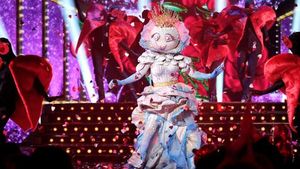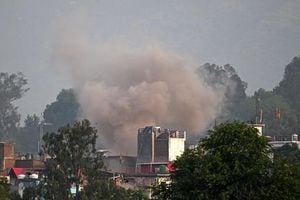In a dramatic escalation of tensions between Ukraine and Russia, a series of drone attacks by Ukrainian forces forced the closure of numerous airports across Russia overnight on May 5-6, 2025. The strikes, which saw a total of 105 drones launched, particularly impacted four airports in Moscow, while others in cities like Volgograd and Nizhny Novgorod were also affected. Despite the chaos, traffic at Sheremetyevo Airport, Moscow's main hub, remained largely unaffected.
Moscow Mayor Sergei Sobyanin reported that air defenses shot down 19 drones in the capital, with debris falling on a major avenue but causing no injuries. However, images broadcast by Russian media showed damage, including a cracked supermarket window and a blackened residential building facade. In regions like Voronezh and Penza, local governors confirmed the interception of 18 and 10 drones, respectively, also without casualties. In a separate incident, an attack on an electrical substation in the Kursk region injured two teenagers.
As these events unfolded, Russian officials were preparing for a significant military parade scheduled for May 9, 2025, to commemorate the 80th anniversary of the end of World War II. President Vladimir Putin is expected to deliver a major address during the event, which will be attended by several world leaders. This parade has been touted by officials as the "grandest" in history, reflecting a long-standing tradition of celebrating Russian patriotism.
In a related development, Ukraine and Russia successfully exchanged over 400 prisoners of war on the Belarusian-Ukrainian border, with each side returning 205 individuals. Ukrainian President Volodymyr Zelenskyy confirmed the exchange, expressing gratitude to the United Arab Emirates for its mediation efforts. Zelenskyy noted that the exchanged individuals included both young and older men from various branches of the Armed Forces, including defenders of Mariupol.
Meanwhile, North Korea's state media reported the arrival of a Belarusian government delegation led by Deputy Prime Minister Yuri Shuleiko for discussions on trade and economic cooperation. This visit underscores the deepening ties between Belarus and North Korea, both of which are viewed as international pariahs and allies of Russia in the ongoing conflict.
On the European front, the European Union (EU) announced plans to phase out all remaining Russian gas imports. On May 6, 2025, the EU is set to outline a roadmap aimed at terminating current contracts and preventing future agreements, as the bloc seeks to reduce its reliance on Russian energy resources. Currently, approximately 19% of the EU's gas imports come from Russia, down from 40% in 2022. The proposed changes have faced challenges, including potential penalties for companies with existing "take or pay" contracts.
In Germany, the political landscape is shifting as Friedrich Merz, a more hawkish figure on Russia, is poised to become chancellor. Although Merz faced an unexpected setback in the first round of voting, his leadership is expected to lead to an increase in military support for Ukraine, including the potential supply of long-range Taurus missiles. This marks a significant departure from the policies of outgoing Chancellor Olaf Scholz, who had been more cautious in military engagements.
As the conflict continues, the situation remains tense. Russian forces have ramped up drone strikes on Ukraine, with one attack on May 5, 2025, resulting in the death of a civilian in Odesa. Ukrainian President Zelenskyy has called for increased pressure on Putin to end the war, criticizing the proposed Russian ceasefire during the upcoming Victory Day celebrations as a mere gimmick.
In a social media post, Zelenskyy remarked, "The Russians are asking for a ceasefire on May 9 and are themselves firing at Ukraine every day." This statement highlights the ongoing challenges in negotiating peace amidst the backdrop of military actions and political maneuvering.
As the world watches, the upcoming days are likely to be pivotal in shaping the future of the conflict. With military parades, diplomatic exchanges, and strategic shifts in European policy, the landscape of the war in Ukraine continues to evolve, bringing with it both uncertainty and urgency.



